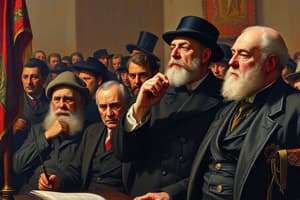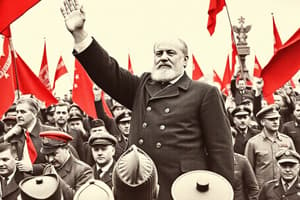Podcast
Questions and Answers
Which of these terms is synonymous to the Bolshevik Revolution?
Which of these terms is synonymous to the Bolshevik Revolution?
- The Communist Revolution (correct)
- The Industrial Revolution
- The French Revolution
- The Glorious Revolution
What was the primary social class in Russia by 1900?
What was the primary social class in Russia by 1900?
- A small, wealthy artisan class
- A large middle-class with land ownership
- A majority rural peasant class living in poverty (correct)
- A small, urban elite living in luxury
Before the 1905 Revolution, what was a key grievance that led to conflict?
Before the 1905 Revolution, what was a key grievance that led to conflict?
- Peaceful protests and impoverished peasants (correct)
- Widespread access to land ownership
- The growth of the Tsars power
- The expansion of trade routes
What did the communist ideology state about the solution to history?
What did the communist ideology state about the solution to history?
Who was the primary leader of the Bolshevik movement, exiled prior to 1917?
Who was the primary leader of the Bolshevik movement, exiled prior to 1917?
What was Tsar Nicholas II's primary motivation for entering World War I?
What was Tsar Nicholas II's primary motivation for entering World War I?
Which of the following was NOT a significant factor contributing to Russia's unpreparedness for WWI?
Which of the following was NOT a significant factor contributing to Russia's unpreparedness for WWI?
What was the primary cause of the March (February) Revolution in Russia?
What was the primary cause of the March (February) Revolution in Russia?
What was the significance of the 'Holy Man' mentioned in the content?
What was the significance of the 'Holy Man' mentioned in the content?
The October (November) Revolution brought about which of the following?
The October (November) Revolution brought about which of the following?
Flashcards
Soviet
Soviet
A group of workers who controlled factories and other industries in the Soviet Union.
Lenin
Lenin
Vladimir Lenin was the leader of the Bolsheviks, a radical socialist group that led the 1917 Russian Revolution.
Bolshevik
Bolshevik
A radical socialist group that seized power in Russia during the 1917 Revolution and established the Soviet Union.
Red vs. Whites
Red vs. Whites
Signup and view all the flashcards
NEP
NEP
Signup and view all the flashcards
Russia's unpreparedness for WWI
Russia's unpreparedness for WWI
Signup and view all the flashcards
The March (February) Revolution
The March (February) Revolution
Signup and view all the flashcards
The October (November) Revolution
The October (November) Revolution
Signup and view all the flashcards
Reds
Reds
Signup and view all the flashcards
What did the Bolsheviks promise?
What did the Bolsheviks promise?
Signup and view all the flashcards
Study Notes
Bolshevik Revolution
- The Six (6) terms to pay particular attention to: Lenin, Soviet, Bolshevik, Red vs. White,NEP, Stalin
- Pre-Revolutionary Russia Big Ideas
- Only true autocracy/no representation in Europe
- Serfdom had been abolished in 1861
- Nicholas was slow to industrialize
- By 1900 about 80% of Russians were still rural peasants, living in severe poverty
- Still very poor
- Some cities and factories
- Poor conditions, wages, food supplies, etc
- Unions and strikes were illegal
- Cause of Bloody Sunday:
- Rapid growth of working class
- People were killed by Tsar's guards
- Result of Bloody Sunday:
- People were killed
- The communists supported the ideas of Karl Marx, which were:
- History is made up of class struggles
- Revolution is the only solution
- The workers must overthrow the owners
- Leaders of this movement in exile before 1917: Vladimir Lenin
Studying That Suits You
Use AI to generate personalized quizzes and flashcards to suit your learning preferences.




